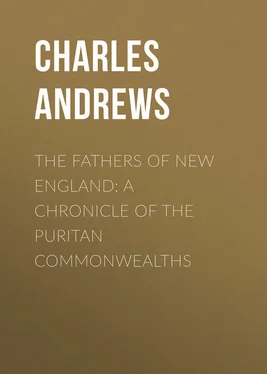Charles Andrews - The Fathers of New England - A Chronicle of the Puritan Commonwealths
Здесь есть возможность читать онлайн «Charles Andrews - The Fathers of New England - A Chronicle of the Puritan Commonwealths» — ознакомительный отрывок электронной книги совершенно бесплатно, а после прочтения отрывка купить полную версию. В некоторых случаях можно слушать аудио, скачать через торрент в формате fb2 и присутствует краткое содержание. Жанр: foreign_antique, foreign_prose, Историческая проза, на английском языке. Описание произведения, (предисловие) а так же отзывы посетителей доступны на портале библиотеки ЛибКат.
- Название:The Fathers of New England: A Chronicle of the Puritan Commonwealths
- Автор:
- Жанр:
- Год:неизвестен
- ISBN:нет данных
- Рейтинг книги:3 / 5. Голосов: 1
-
Избранное:Добавить в избранное
- Отзывы:
-
Ваша оценка:
- 60
- 1
- 2
- 3
- 4
- 5
The Fathers of New England: A Chronicle of the Puritan Commonwealths: краткое содержание, описание и аннотация
Предлагаем к чтению аннотацию, описание, краткое содержание или предисловие (зависит от того, что написал сам автор книги «The Fathers of New England: A Chronicle of the Puritan Commonwealths»). Если вы не нашли необходимую информацию о книге — напишите в комментариях, мы постараемся отыскать её.
The Fathers of New England: A Chronicle of the Puritan Commonwealths — читать онлайн ознакомительный отрывок
Ниже представлен текст книги, разбитый по страницам. Система сохранения места последней прочитанной страницы, позволяет с удобством читать онлайн бесплатно книгу «The Fathers of New England: A Chronicle of the Puritan Commonwealths», без необходимости каждый раз заново искать на чём Вы остановились. Поставьте закладку, и сможете в любой момент перейти на страницу, на которой закончили чтение.
Интервал:
Закладка:
The settlements formed by these squatters and stragglers were quite unauthorized by the New England Council, which owned the title to the soil. As this Council had accomplished very little under its patent, Sir Ferdinando Gorges, its most active member, persisted in his efforts to found a colony, brought about a general distribution of the territory among its members, and obtained for himself and his son Robert, the section around and immediately north of Massachusetts Bay. An expedition was at once launched. In September, 1623, Robert Gorges with six gentlemen and a well-equipped and well-organized body of settlers reached Plymouth, – the forerunners, it was hoped, of a large number to come. This company of settlers was composed of families, the heads of which were mechanics and farmers, and with them were two clergymen, Morrell and Blackstone, the whole constituting the greatest enterprise set on foot in America by the Council. Robert Gorges, bearing a commission constituting him Governor-General over all New England, made his settlement at Weston's old place at Wessagusset. Here he built houses and stored his goods and began the founding of Weymouth, the second permanent habitation in New England and the first on Massachusetts Bay. Unfortunately, famine, that arch-enemy of all the early settlers, fell upon his company, his father's resources in England proved inadequate, and he and others were obliged to return. Of those that remained a few stayed at Wessagusset; one of the clergymen, William Blackstone, with his wife went to Shawmut (Boston); Samuel Maverick and his wife, to Winnissimmet (Chelsea); and the Walfords, to Mishawum (Charlestown). Probably all these people were Anglicans; some later became freemen of the Massachusetts colony; others who refused to conform returned to England; but Blackstone remained in his little cottage on the south slope of Beacon Hill, unwilling to join any of the churches, because, as he said, he came from England to escape the "Lord Bishops," and he did not propose in America to be under the "Lord Brethren."
The colony of Massachusetts Bay began as a fishing venture with profit as its object. It so happened that the Pilgrims wished to secure a right to fish off Cape Ann, and through one of their number they applied to Lord Sheffield, a member of the Council who had shared in the distribution of 1623. Sheffield caused a patent to be drawn, which the Plymouth people conveyed to a Dorchester company desiring to establish a fishing colony in New England. The chief promoter of the Dorchester venture was the Reverend John White, a conforming Puritan clergyman, in whose congregation was one John Endecott. The company thus organized remained in England but sent some fourteen settlers to Cape Ann in the winter of 1623-1624. Fishing and planting, however, did not go well together, the venture failed, and the settlers removed southward to Naumkeag (Salem). Though many of the English company desired to abandon the undertaking, there were others, among whom were a few Puritans or Nonconformists, who favored its continuance. These men consulted with others of like mind in London, and through the help of the Earl of Warwick, a nobleman friendly to the Puritan cause, a patent was issued by the Council to Endecott and five associates, for land extending from above the Merrimac to below the Charles. This patent, it will be noticed, included the territory already granted to Gorges and his son Robert, and was obtained apparently with the consent of Gorges, who thought that his own and his son's rights would be safely protected. Under this patent, the partners sent over Endecott as governor with sixty others to begin a colony at Salem, where the "old planters" from Cape Ann had already established themselves. Salem was thus a plantation from September, 1628, to the summer of 1630, on land granted to the associates in England; and the relations of these two were much the same as those of Jamestown with the London Company.
Endecott and his associates soon made it evident, however, that they were planning larger things for themselves and had no intention, if they could help it, of recognizing the claims of Gorges and his son. They wanted complete control of their territory in New England, and to this end they applied to the Crown for a confirmation of their land-patent and for a charter of incorporation as a company with full powers of government. As this application was a deliberate defiance of Gorges and the New England Council, it has always been a matter of surprise that the associates were able to gain the support of the Crown in this effort to oust Gorges and his son from lands that were legally theirs. No satisfactory explanation has ever been advanced, but it is worthy of note that at this juncture Gorges was in France in the service of the King, whereas on the side of the associates and their friends was the Earl of Warwick, himself deeply interested in colonizing projects and one of the most powerful men in England. The charter was obtained March 4, 1629 – how, we do not know. It created a corporation of twenty-six members, Anglicans and Nonconformists, known as the Massachusetts Bay Company.
But if the original purpose of this company was to engage in a business enterprise for the sake of profit, it soon underwent a noteworthy transformation. In 1629, control passed into the hands of those members of the company in whom a religious motive was uppermost. How far the charter was planned at first as a Puritan contrivance to be used in case of need will never be known. It is equally uncertain whether the particular form of charter, with the place of the company's residence omitted, was selected to facilitate a possible removal of the company from England to America; but it is likely that removal was early in the minds of the Puritan members of the company. At this time a great many people felt as did the Reverend John White, who expressed the hope that God's people should turn with eyes of longing to the free and open spaces of the New World, whither they might flee to be at peace. But, when the charter was granted, the Puritans were not in control of the company, which remained in England for a year after it was incorporated, superintending the management of its colony just as other trading companies had done.
But events were moving rapidly in England. Between March, 1629, and March, 1630, Parliament was dissolved under circumstances of great excitement, parliamentary privileges were set aside, parliamentary leaders were sent to the Tower, and the period of royal rule without Parliament began. The heavy hand of an autocratic government fell on all those within reach who upheld the Puritan cause, among whom was John Winthrop, a country squire, forty-one years of age, who was deprived of his office as attorney in the Court of Wards. Disillusioned as to life in England because of financial losses and family bereavements, and now barred from his customary employment by act of the Government, he turned his thoughts toward America. Acting with the approval of the Earl of Warwick and in conjunction with a group of Puritan friends – Thomas Dudley, Isaac Johnson, Richard Saltonstall, and John Humphrey, – he decided in the summer of 1629 to leave England forever, and in September he joined the Massachusetts Bay Company. Almost immediately he showed his capacity for leadership, was soon elected governor, and was able during the following winter to obtain such a control of affairs as to secure a vote in favor of the transfer of charter and company to New England. The official organization was remodeled so that only those desiring to remove should be in control, and on March 29, 1630, the company with its charter, accompanied by a considerable number of prospective colonists, set sail from Cowes near the Isle of Wight in four vessels, the Arabella , the Talbot , the Ambrose , and the Jewel , the remaining passengers following in seven other vessels a week or two later. The voyages of the vessels were long, none less than nine weeks, by way of the Azores and the Maine coast, and the distressed Puritans, seven hundred altogether, scurvy-stricken and reduced in numbers by many deaths, did not reach Salem until June and July. Hence they moved on to Charlestown, set up their tents on the slope of the hill, and on the 23rd of August, held the first official meeting of the company on American soil; but finding no running water in the place and still pursued by sickness and death, they again removed, this time to Boston, where they built houses against the winter. With the founding of this colony – the colony of Massachusetts Bay – a new era for New England began.
Читать дальшеИнтервал:
Закладка:
Похожие книги на «The Fathers of New England: A Chronicle of the Puritan Commonwealths»
Представляем Вашему вниманию похожие книги на «The Fathers of New England: A Chronicle of the Puritan Commonwealths» списком для выбора. Мы отобрали схожую по названию и смыслу литературу в надежде предоставить читателям больше вариантов отыскать новые, интересные, ещё непрочитанные произведения.
Обсуждение, отзывы о книге «The Fathers of New England: A Chronicle of the Puritan Commonwealths» и просто собственные мнения читателей. Оставьте ваши комментарии, напишите, что Вы думаете о произведении, его смысле или главных героях. Укажите что конкретно понравилось, а что нет, и почему Вы так считаете.












